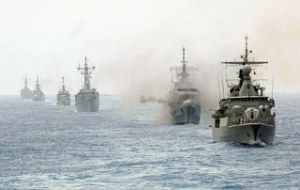MercoPress. South Atlantic News Agency
Caribbean chapter of the US-Russia Georgia dispute

The Venezuelan government confirmed on Sunday that four Russian naval vessels will participate in joint exercises in the Caribbean next November, a move that could further strain relations between Washington and Moscow following the Russian invasion of Georgia.
Venezuela's naval intelligence chief, Admiral Salbatore Cammarata Bastidas, said in a statement that a task force including four Russian naval vessels and 1,000 Russian military personnel would take part between November 10 and 14 in exercises with Venezuelan frigates, patrol boats, submarines and aircraft. The announcement came shortly after Russian Prime Minister Vladimir Putin warned that the North Atlantic Treaty Organization's deployment of several warships to the Black Sea in the aftermath of Russia's invasion of Georgia last month would not go unanswered. The Financial Times also reported over the weekend, as Putin had claimed, that US agencies trained and supplied military equipments to the special Georgian forces that had taken the separatist regions of Abkhazia and South Ossetia, which triggered the Russian invasion of Georgia and occupation of specific military targets. The Russian agreement to send ships also could be seen as part of Venezuelan President Hugo Chavez's campaign to build up his military, an effort that includes arms deals and a recent decree that gives his armed forces a greater role in carrying out his social agenda. Chavez has said the actions are to ward off what he has described as US imperialist designs on Venezuela and its vast oil reserves. He has long suspected that the US supported a failed 2002 coup against him. The President Bush administration had described Chavez as a "destabilizing" element in the region. But the Venezuelan leader is particularly unhappy with the re-formation of the US 4th Fleet, based in Mayport, Florida which has just begun patrolling the Caribbean after having been disbanded in 1953. Brazil and Argentina have all presented formal protests about the re launching of US 4th Fleet. Officials at the US military's Southern Command in Miami have said the 4th Fleet's re-creation is organizational in purpose and is not a response to tensions with Chavez. It involves no addition to forces already stationed at Mayport, Southern Command said. The announcement of the November exercises did not come as a total surprise. Chavez said during a visit to Russia in July that its ships and airplanes were welcome in Venezuela and declared links with Moscow as "strategic". Admiral Cammarata revealed that an assistant to Russian Admiral Popov Fedorovich had been in Venezuela to plan the exercise adding that the vessels could appear in the region before the exercises. Since 2004 Venezuela has spent 4 billion US dollars on military hardware, purchased mainly from Russia, according to the Security and Democracy Foundation of Caracas. Those deals included the purchase of 53 Russian helicopters and 24 Sukhoi fighter jets. Venezuela is also purchasing rights and technology for a factory near Caracas to build Kalashnikov assault rifles In recent months, Chavez advisors have said Venezuela was considering the purchase of as many as five diesel-powered Russian submarines. The deal would make Venezuela the region's top naval force, said retired Gen. Alberto Muller Rojas, a Chavez confidant. Venezuelan officials have justified arms purchases from Russia by noting the US ban on all weapons sales by US companies to Venezuela, a mandate that extends to foreign manufacturers' arms that contain US components. Chavez's planned deals with Israeli, Swedish and Spanish arms manufacturers never materialized because they included U.S. parts and instruments. The Venezuelan president has said he was forced to buy aircraft from Russia after the Pentagon refused to sell him spare parts for an aging fleet of US -made F-16 fighters. Venezuela also became the second country, behind Byelorussia, to support Russia's decision to recognize the independence of the Georgian separatist regions of Abkhazia South Ossetia.




Top Comments
Disclaimer & comment rulesCommenting for this story is now closed.
If you have a Facebook account, become a fan and comment on our Facebook Page!